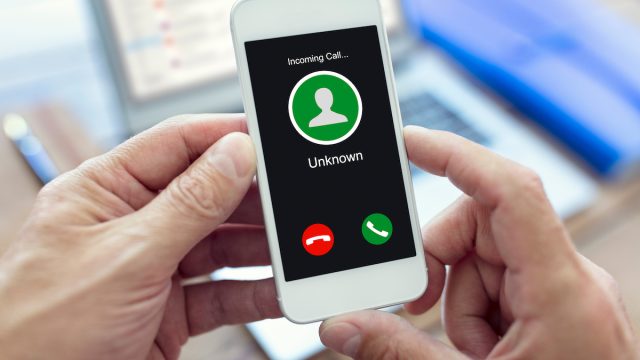9 Ways to Rid Your Life of Telemarketers and Scammers for Good

Consumer fraud, spam calls, and telemarketers have all been on the rise in recent years. In fact, according to the consumer protection company YouMail (via USA Today), there was a 20 percent increase in robocalls in the span of just one year, from 2018 to 2019. After a brief dip attributed to the COVID pandemic, fraudulent calls and scams are now back on the rise.
If you’ve been experiencing a higher-than-normal volume of scammers and spammers, you may be wondering how to defend yourself from these annoying and unsavory solicitations. That’s why we’ve rounded up a group of tech experts to tell us just that. They’re sharing their best advice, both for outfoxing con artists and for minimizing unwelcome calls from pushy companies. Read on to learn the 10 best ways to rid your life of spam calls and scammers, so you can finally silence the distractions and keep yourself safe.
RELATED: Scammers Are Targeting Older Adults in a Costly New Way, FBI Warns.
How to Block Spam Calls
1. Enable call blocking and screening apps.

If you’re constantly inundated with calls, texts, and emails from telemarketers and scammers, it may be time to download a call-blocking or email-screening app.
James Herman, a tech expert and founder of Mobile Tech Addicts, recommends Hiya and Truecaller, which he says are effective at automatically blocking telemarketing numbers.
These apps employ a range of tactics in blocking robocalls, Herman explains. While some ask unknown callers to identify themselves before connecting the call, others check incoming numbers against a database of known scammers or attempt to identify every incoming call. “This provides an additional layer of protection against unsolicited calls,” Herman tells Best Life.
2. Register your number on the National Do Not Call Registry.

Registering your phone number on the National Do Not Call Registry is a “cost-free and straightforward method” for reducing unwanted calls from telemarketers, says Vikas Kaushik, a tech expert and CEO at TechAhead.
Herman agrees that this can be an effective solution to constant calls. “Telemarketers are legally obligated to avoid calling numbers on this list. This can significantly reduce the volume of unsolicited calls you receive,” he says.
While registering is unlikely to eliminate calls completely, it does give you grounds for recourse. If a telemarketer calls you 31 days after you register your number, you can officially file a complaint with the Federal Trade Commission (FTC).
RELATED: 5 Texts That Are Always Scams, Experts Warn.
3. Activate your device’s built-in filters.

Whether you’re being solicited by phone, text, or email, you may be able to protect yourself by using your device’s in-house features. For instance, many phones give you the option of silencing calls from unknown numbers. This feature, which you can choose in your “Settings” menu, will automatically send unknown callers directly to voicemail, appearing only in your recent call list.
4. Install a VoIP service.

Several of the experts we spoke to also recommended using Voice over Internet Protocol (VoIP) services, such as Google Voice, Skype, or Zoom, to reduce the number of telemarketing calls you receive.
According to the United States Computer Emergency Readiness Team (US-CERT), VoIP “is a form of communication that allows you to make phone calls over a broadband internet connection instead of typical analog telephone lines.”
“These services often have advanced call filtering options and allow you to maintain greater control over who contacts you,” says Herman.
RELATED: Get a “Hi” Text From a Stranger? Watch Out for a Scam That Could Cost You Millions.
5. Opt out during calls.

Many “telemarketers” are actually scammers, but some are legitimate companies with annoying marketing tactics. If you believe you are receiving a call from the latter, Phil Portman, founder of the automated SMS marketing software Textdrip, says you should be able to opt-out during the call.
“Politely ask telemarketers to remove your number from their calling list during the call. Legitimate telemarketers should comply,” he notes.
6. Use a custom whitelist for phone calls.

It’s easier to choose who can contact you than to blacklist those who can’t. That’s why Herman recommends using a custom “whitelist,” which allows only trusted, pre-selected callers to contact you.
“Create custom whitelists on your smartphone, only allowing calls from contacts or pre-approved numbers. This method ensures that only trusted individuals can reach you directly,” he says.
RELATED: 5 Ways to Protect Your Facebook From Hackers.
7. Report scams and spam.

If you have fallen victim to a scam or spam, you should make a point of reporting the incident, says Herman. “Report spam calls both to your mobile carrier and the Federal Trade Commission (FTC). The more information authorities have about nuisance callers, the better they can take action against them,” he says.
You can also file a report with the Federal Communications Commission’s (FCC) Consumer Inquiries and Complaints division.
8. Consider trying a call privacy service.

It’s now considered common for various businesses and institutions to request your contact information. Herman recommends using a call privacy service for these occasions, which will help protect your personal phone line from widespread distribution.
“Look into call privacy services like Sudo or Burner. These apps provide disposable phone numbers that you can use for specific purposes, like online forms or registrations, protecting your primary number from telemarketing outreach,” he says.
RELATED: 5 Warnings About Buying and Selling on Facebook Marketplace, Experts Say.
9. Educate yourself.

Making yourself aware of common scams is another great way to protect yourself from them. After all, some scammers are especially adept at deceit, often by impersonating the people or companies you trust.
“Stay informed about common telemarketing scams and tactics. Being aware of these can help you recognize and avoid such calls,” says Herman.
For more tech tips sent directly to your inbox, sign up for our daily newsletter.